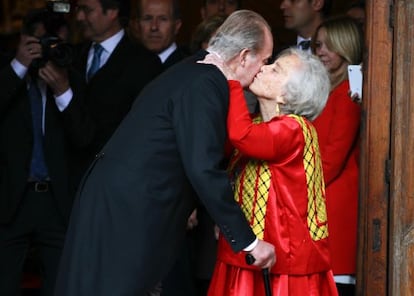Elena Poniatowska, chronicler of inequality, accepts Cervantes prize
The 81-year-old Mexican is the fourth woman to receive the prestigious literary award

Elena Poniatowska, the Mexican journalist and writer, on Wednesday became just the fourth woman to pick up the Cervantes Prize, a top literary award in the Spanish language.
“The silence of the poor is a silence representing centuries’ worth of being forgotten and pushed back to the edges of society,” said the 81-year-old author during her acceptance speech in Alcalá de Henares (Madrid).
The winners of the literary achievement award, now into its 39th edition, are traditionally announced toward the end of the year, but the ceremony is held on the following April 23, coinciding with the death of Don Quixote author Miguel de Cervantes, after whom the prize is named.
Wearing a traditional red-and-yellow dress given to her by women from Juchitán, Poniatowska remembered the recently deceased Gabriel García Márquez in her speech.
Before Gabo, we were the condemned people of the Earth”
“Before Gabo, we were the condemned people of the Earth. But with his One Hundred Years of Solitude, he gave wings to Latin America. And that great flight still surrounds us today, helping flowers grow from our heads,” she said in a tone that betrayed her nerves, which she had admitted to in earlier statements to the Efe news agency.
But her storytelling ability was stronger than her stage fright, and in the end Poniatowska was able to tell another little piece of the sad story that she has been chronicling for the last 60 years: the story of Latin America’s disenfranchised people, its women, its children, its seniors, its prisoners and its rebel students. But above all, its women.
“Before the United States attempted to swallow up the entire continent, indigenous resistance raised golden shields and tufts of feathers and raised them high when the women of Chiapas, once submissive and furtive, declared in 1994 that they wanted to choose their men, look them in the eyes, have the number of children that they themselves desired and not be traded in for a jug of alcohol,” said this Paris-born, upper-class woman of Polish origin who went on to become the voice of Mexico’s poor and humble after moving there at age 10.
In 1954, at age 18, she began working for the Mexican newspaper Excelsior. Since then, she has written around 50 works that include essays, novels and biographies. Her most famous books are La noche de Tlatelolco (published in English as Massacre in Mexico), about the 1968 student protests, and Las soldaderas, Women of the Mexican Revolution, about female soldiers during the civil conflict of 1910-1920.
The jury underscored her work’s “firm commitment to contemporary history” and described the author as “one of the most powerful voices in Spanish-language literature these days.”
Tu suscripción se está usando en otro dispositivo
¿Quieres añadir otro usuario a tu suscripción?
Si continúas leyendo en este dispositivo, no se podrá leer en el otro.
FlechaTu suscripción se está usando en otro dispositivo y solo puedes acceder a EL PAÍS desde un dispositivo a la vez.
Si quieres compartir tu cuenta, cambia tu suscripción a la modalidad Premium, así podrás añadir otro usuario. Cada uno accederá con su propia cuenta de email, lo que os permitirá personalizar vuestra experiencia en EL PAÍS.
¿Tienes una suscripción de empresa? Accede aquí para contratar más cuentas.
En el caso de no saber quién está usando tu cuenta, te recomendamos cambiar tu contraseña aquí.
Si decides continuar compartiendo tu cuenta, este mensaje se mostrará en tu dispositivo y en el de la otra persona que está usando tu cuenta de forma indefinida, afectando a tu experiencia de lectura. Puedes consultar aquí los términos y condiciones de la suscripción digital.








































